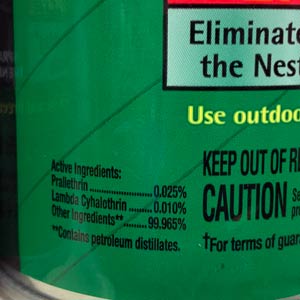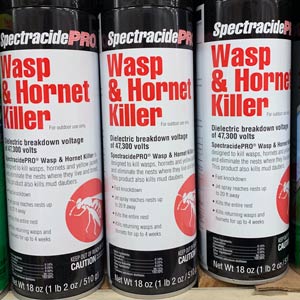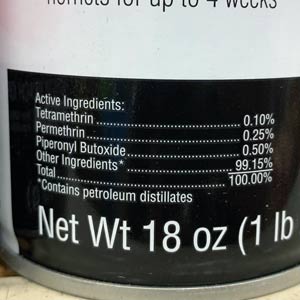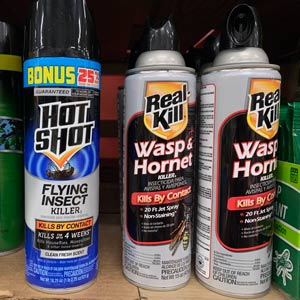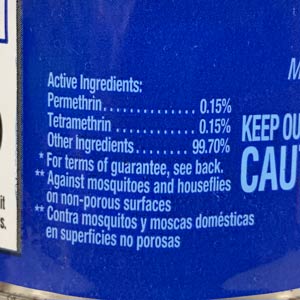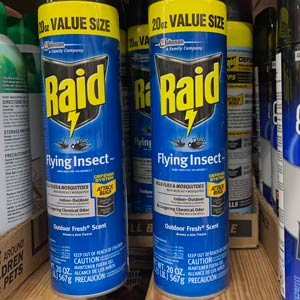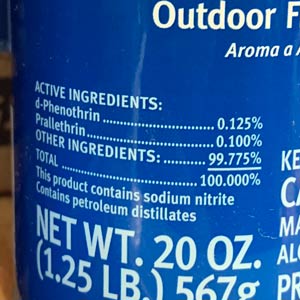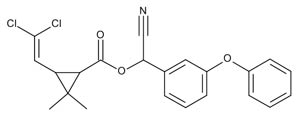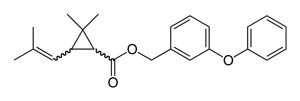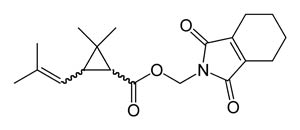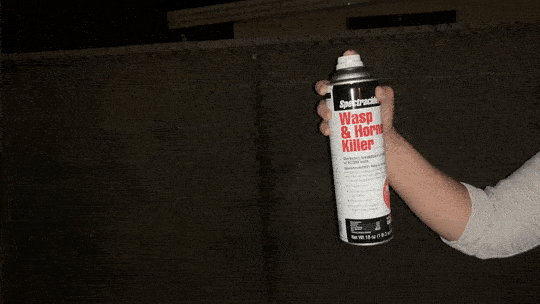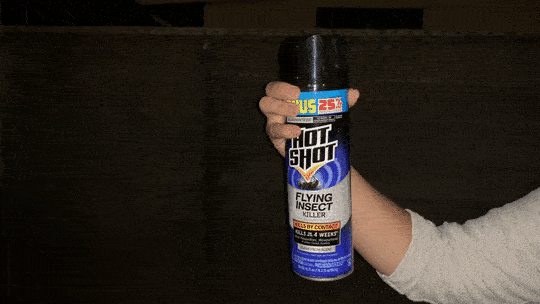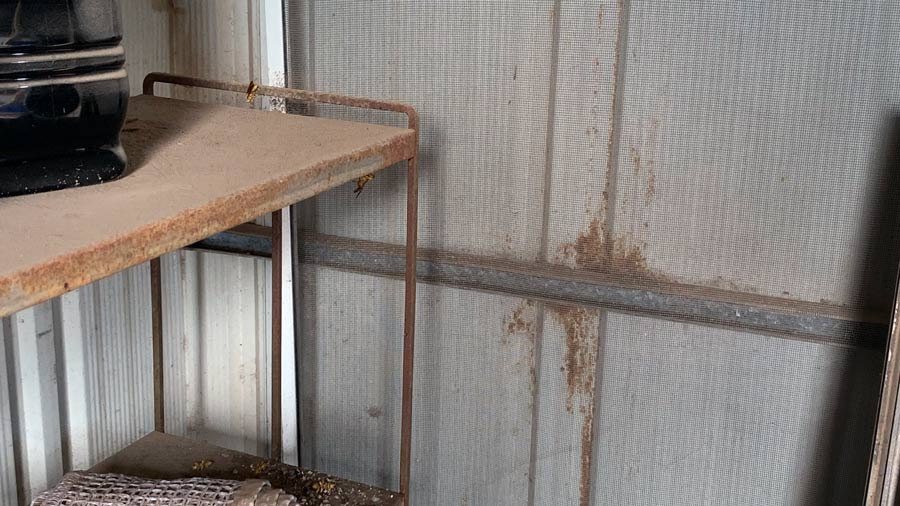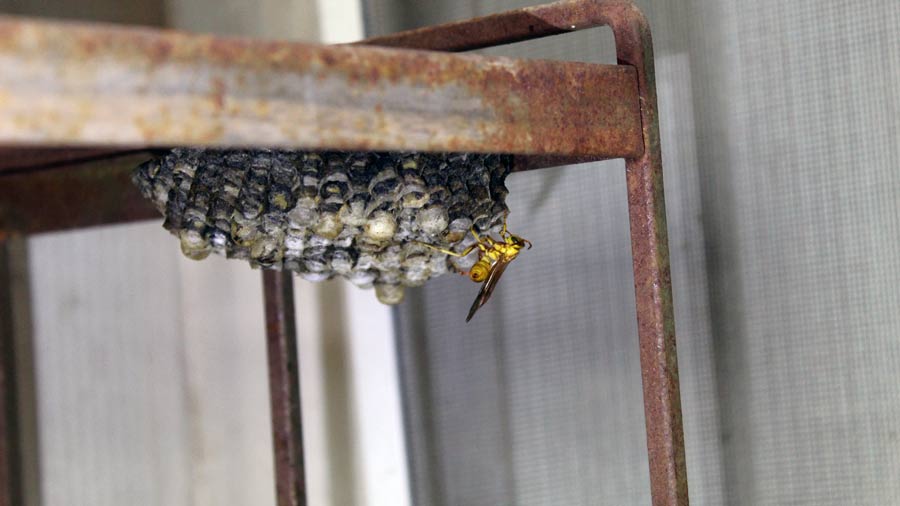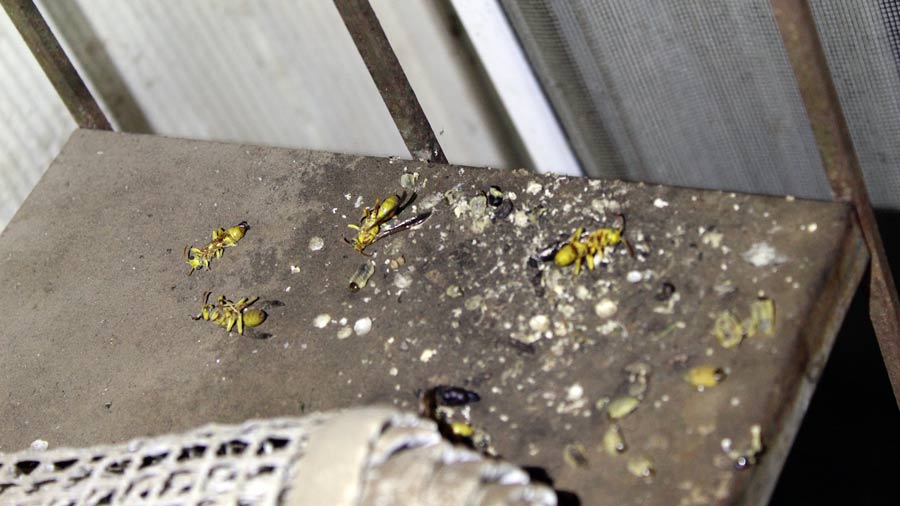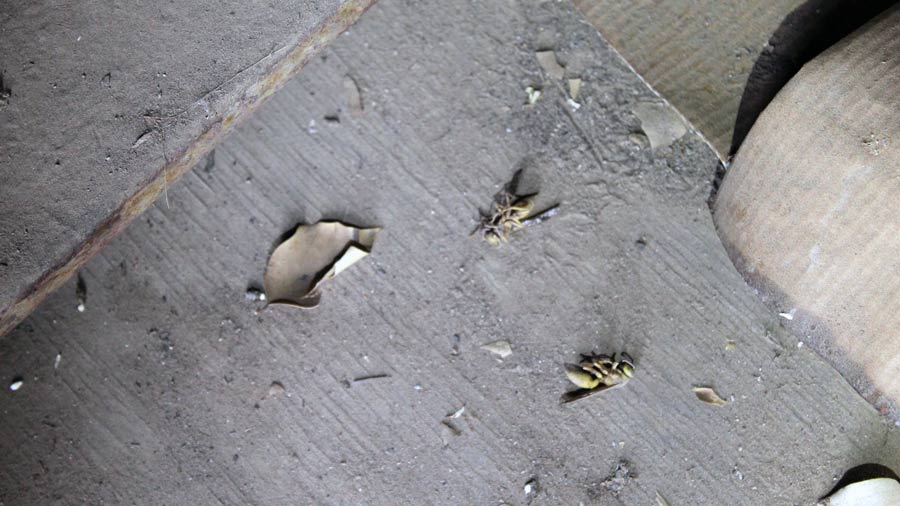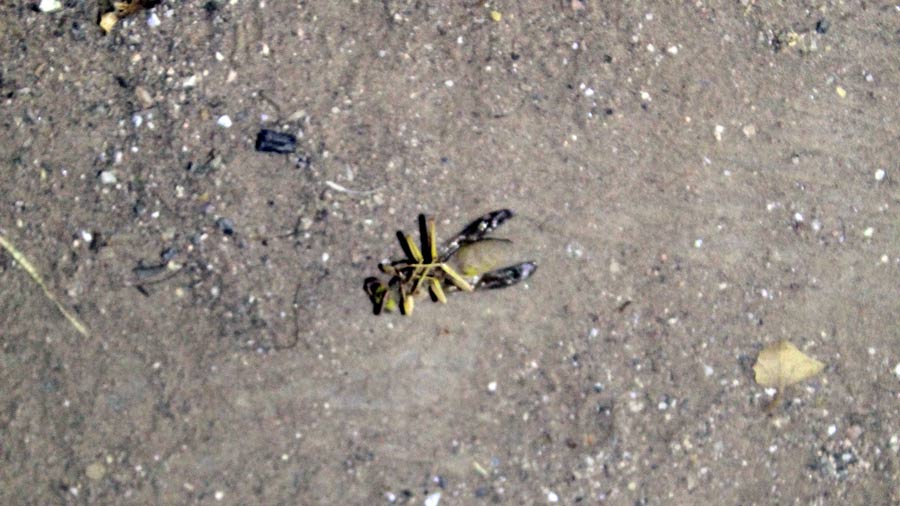The Garage Makeover Blog by Slide-Lok
The Best Wasp & Hornet Spray from Home Depot in 2019
8/2/2019
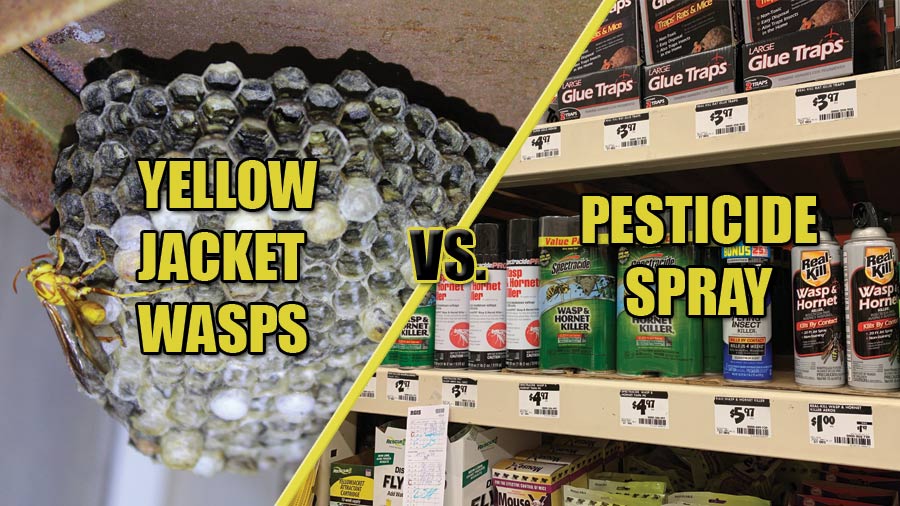
Wasp nest in my backyard and pesticide sprays at The Home Depot in Tempe, Arizona.
WARNING: Proceed with caution. Do not attempt without understanding the risks involved in using pesticide sprays and your health. You may get stung. We are not responsible for you getting stung, injured, or adverse affects with the toxic chemicals. If you are afraid or allergic we recommend you call a professional exterminator.
It is currently 109°F outside of my office in Phoenix, Arizona. You'd think every critter in the West would be fighting over shade as the brutal Arizona sun continues to beat down on us. Yet, insects and pests are thriving in the desert, West Nile Virus cases are up in the Valley of the Sun. Recently, my neighbor elected to murder my beautiful backyard scenery by chopping down three of his large palm trees. I didn't think much of it other than I had just lost a very peaceful view from my backyard. Almost immediately following my now palm tree-less view, there seemed to be more insects and pests in my yard. I wonder if they had lost their home amongst the palm trees or was it just a coincidence? Anyways, wasp after wasp I noticed there appeared to be way too many wasps near my recently completed backyard patio renovation (that blog post is coming soon). I had been doing backyard landscaping recently, so it was easy to notice this alien-like invasion of my backyard. It felt like these wasps had moved into my backyard shed overnight. Now how do I get rid of them?
Professional Pest Removal vs. DIY Pesticide Sprays
I'm a pretty handy guy when it comes to doing things myself, however, insects and pests are something I really don't jump up and down to tackle. For risk of being bitten or stung, followed by a trip to my local urgent care I usually have little desire to intervene with spiders, scorpions, snakes and the like. Back in march I was bitten/stung by a spider and within a few days my calf was red, swollen and very painful due to it getting infected. That's a story for another day, so let's discuss my options. I can call in an exterminator or handle the wasps myself. After researching online and calling a few extermination companies for quotes I was ready to give this a shot myself. Local pest exterminators quoted a charge to inspect the nest and then couldn't guarantee a price for removal, that's a separate charge, and if XXX happened or occurred there's another charge for that. I hate being nickeled and dimed with extra fees and charges so I figured I'd give this a shot myself first. Home Depot had various pesticide sprays which were all less than $10, the alternative was $149 (inspection) + unknown (extra fees) to remove the nest, really wasn't a close contest at all.
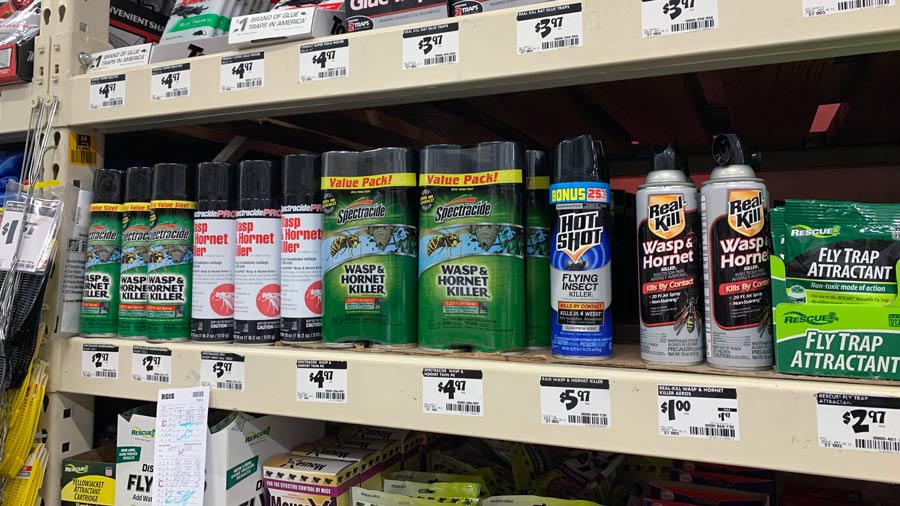
Looking at all these pesticide sprays, how do you pick the best one?
How do you pick the best DIY wasp or hornet pesticide spray?
This is the exact question I was asking myself as I stood in the aisle at my local Home Depot last week. There were just too many options, and since they were all affordably priced this became about effectiveness since price was not an issue. I found myself on my smartphone googling for the next 30 minutes while standing in the Home Depot aisle...
"What is the best Wasp spray at Home Depot?"
There were quite a few articles talking about over the counter pesticide sprays available to the average consumer. None of these articles hit on potency or effectiveness of the sprays. Having a science degree I figured it was time to research the active ingredients of these pesticide sprays to determine which is more potent and effective.
"What is the strongest pesticide chemical for killing wasps?"
There were a few promising search results: "best wasp sprays of 2019", "chemicals that kill wasps", "top 3 best wasp sprays" and "Best Wasp Sprays, Better than Raid". The first few search results didn't deliver the information that I was looking for. However, that last one, touting sprays better than Raid really caught my attention. Now, it didn't directly give me the answer I was seeking. It did provide indirect information that could be important to my continued research. The link didn't go to an article, rather an online store which sells higher concentration pesticides which lists the active ingredients and percentages on each individual product. For instance, this concentrated pesticide contained permethrin at 36.8%, wow! The closest spray at Home Depot only measured up to 0.25% permethrin.
Read The Active Ingredients List, Research, Rank by Potency / Effectiveness and Concentration.
My methodology for my next Google searches were based on the active ingredients of the pesticide sprays. Wonder if anyone has compared these chemicals before...
"Tetramethrin vs. Permethrin vs. d-Phenothrin vs. Prallethrin vs. Cypermethrin vs Lambda Cyhalothrin?"
Which, in a way is the same as searching this:
"Spectracide vs. Spectracide Pro vs. Hot Shot vs. Real Kill vs. Raid"
All Google returns is the same old bloated marketing spiel that differs for each product depending on which link you click on...
No good search results came back... That doesn't mean we can't still figure this out for ourselves. If you look at all of these active ingredients you might wonder if they're related chemicals because they sound similar. Tetramethrin, Permethrin, d-Phenothrin, Cypermethrin, Lambda Cyhalothrin. Did you notice that they all end in -thrin? That's because they are in some regard part of the same chemical family or type of chemicals used as insecticides and pesticides. These active ingredients are all man-made synthetic versions of a naturally occurring chemical known as pyrethrin. The man-made synthetic derivatives are part of a family of chemicals called pyrethroids, which is an organic compound (carbon based) based on pyrethrin. Pyrethrin compounds are produced by pyrethrum flowers (Chrysanthemum flowers). No one has taken the time to compile a report comparing these chemicals because they are manufactured by different companies that make their own respective, competing, pesticide products. The potency, effectiveness as a pesticide, and other physical properties will differ amongst these chemicals because they are not 100% identical. You'd have to compile the technical data and safety data sheets, research articles, EPA information, and the like for each. It's not impossible to do, just a large outlay of time to find a marginally better product.
Pyrethroids are synthetic, man-made, chemicals that mimic the naturally occurring pesticide pyrethrin. Pyrethrin has been and is still used as an insecticide and pesticide for decades. The synthetic versions that are used in today's pesticides are all more effective than the naturally occurring chemical pyrethrin. This means they last much longer in the environment, don't break down as easily in the insect/pest's system and are overall more toxic to the pests and the environment.
Pyrethroids are synthetic man-made compunds based on pyrethrin. These synthetic compounds are modified to increase their toxicity and delay degradability. Modifying compounds for these traits will ultimately make a superior pesticide. That's exactly what these companies have done, they've taken a compound found in nature and modified the structure to be a better pesticide. Naturally occurring pyrethrin degrades in the environment rather quickly and from exposure to UV radiation (sunlight). Insects have even adapted to metabolize pyrethrin for better chances of survival. Pesticide spray formulations containing pyrethroids are often combined with synergists such as piperonyl butoxide (PBO) which prevents insects from metabolizing/breaking down the insecticide, thereby making the spray much more effective. Take a look at some of these pyrethroid chemical structures below, you may notice that most of them are very similar in chemical structure. They are modified versions of pyrethrin, similar in structure, sometimes featuring an extra bond, molecule or compound. The final pesticide spray containing these pyrethroids are often mixtures of these compounds, and these compounds in and of themselves can often feature up to 8 different stereoisomers (same chemical structure and sequence, but feature a different arrangement in space).
Choose the Highest Concentration Pesticide Available
I came to the conclusion standing in Home Depot's aisle that I should just pick the pesticide with the highest concentration of active ingredients. The pyrethroids in any of these products should all be more than capable of doing the job of killing my wasp invasion. After all, the pyrethroids are more persistent in the environment (break down slower), and are generally made to be more toxic than the naturally occurring pyrethrin. Among the handful of pesticide sprays available at Home Depot, the concentration of active ingredients varied quite a bit. The concentration of these products ranged from 0.035% (Spectracide) to 0.85% (Spectracide Pro), just a coincidence that the least and most concentrated products were of the same brand. The more concentrated Spectracide Pro contained more than 24x as much active ingredients as the non "Pro" version for only $1 more. It was no contest which to choose, $2.97 vs $3.97 which contained 24x (2,400% more) permethrin; I purchased one can of the Spectracide Pro Wasp and Hornet Killer. Just to be safe I also purchased the Hot Shot Flying Insect Killer spray which contained the second most active ingredients at 0.30%.
Industrial Strength Concentrated Pyrethroid Pesticide: Permethrin 36.8%
This high concentrated permethrin pesticide is 105,142% (1,051 times more concentrated) more concentrated than the lowest 0.035% active ingredient Spectracide Pesticide at Home Depot. Talk about bang for your buck! However, this is quite concentrated and really only recommended for professionals that will end up diluting the product. It also comes with a professional price tag, $23.97 for 16 oz. That's roughly 8x more costly than what's on the shelves at home depot ($24/$3 = 8x). Although it is 8x more costly, diluted to the levels of Spectracide Pro (0.85%), it comes out to 43 cans of Spectracide Pro (36.8% / 0.85% = 43.29) or roughly $0.55/equivalent concentration can of Spectracide Pro ($24 / 43 cans). Of course that is probably much more pesticide than the average consumer requires. Which is why I would just recommend purchasing a single can of the Spectracide Pro at your local home improvement store vs buying concentrated pesticide chemicals.
Safe Wasp Spraying Distance
Whilst researching the active ingredients of these pesticide sprays in Home Depot's aisle I had also read some useful information when it came to exterminating wasps. First of all, wasps are much more aggressive than bees and can repeatedly sting you because their stinger does not fall off. Yikes! So clearly, I needed to make sure I could spray these suckers from as far away as possible and then run back to the safety of my house before being repeatedly stung. Secondly, wasps are more docile at night, don't shine light directly on them and you'll have extra time to spray and run before risking getting stung. Since I purchased two different pesticide sprays I figured I would test their spray distance and use the one that sprayed the furthest.
Spectracide Pro vs. Hot Shot Spraying Distance
Conclusion: Spectracide Pro, The Best Wasp Pesticide Spray at Home Depot in 2019
Around 9 p.m. at night I tackled the wasps nest that invaded my backyard. Well, I didn't really tackle it. I got about 5 feet away and sprayed it with the Spectracide Pro pesticide. The wasp nest began to hum as its inhabitants became alert, twitching their wings and boom! One by one they fell to the floor. The spray had worked. The pyrethroids had infiltrated the nerve endings in the insects and killed them; the chemical works by delaying the closure of voltage gated sodium ion channels in the insects. This basically causes the insect to spasm to death due to loss of coordination and paralysis, imagine if all of your nerve endings just began firing without proper control, your brain would short circuit so to speak. The wasps were dead. I was a happy homeowner. For just a couple of dollars I had eliminated my growing wasp problem. I estimate the wasp nest was home to 5-10 wasps.
Pyrethrin / Pyrethroid Use & Human Health Concerns
As with most things in life, there are limits where things become dangerous to us. For the time being the amount of research studies on pyrethrins and pyrethroids are relatively incomplete. The US EPA and CDC in conjunction with ATSDR (Agency for Toxic Substances & Disease Registry) have not issued any hard guidelines as far as toxicity relating to chronic illness, deaths, and cancer. The few studies that do exist suggest that mammalian rats have a high likelihood of developing cancer in the form of liver tumors. However, the US EPA has classified pyrethrins as not likely to cause cancer in humans, because of the large threshold value of the pesticide ingredient you would need to come in contact with is just unlikely. Homeowners should stay away from the concentrated professional pesticide sprays, you could be exposing yourself to 100,000+% the level of pesticide in the consumer grade spray cans from your local home improvement store.
Resources You May Be Interested In Reading on Pyrethrins and Pyrethroids
- ATSDR - Agency for Toxic Substances & Disease Registry - Pyrethrins and Pyrethroids
- What Are Pyrethrins? - National Pesticide Information Center by Oregon State University
- Pesticides are everywhere, and more dangerous than you realize - The Verge
Become a Slide-Lok Floor & Cabinet Dealer
Open your contracting business to more opportunities with Slide-Lok. Slide-Lok is your one stop shop for garage flooring and storage solutions since 1977. Inquire today and discover the benefits of Slide-Lok Garage Interiors.
About The Author

Samuel Strayer has a B.S. in Biochemistry from Arizona State University. Samuel is our marketing director and in house formulations chemist; He has over 10 years of experience designing, creating, and managing our websites as well as 7+ years of chemistry related experience. When Samuel is out of the office he enjoys mountain biking, off-roading, working on cars, and completing home improvement projects.
Keywords: pesticide, insecticide, spray, wasp, hornet, killer, exterminator, pest, control, best, home depot, home improvement, diy
© Copyright, 2019, Slide-Lok (DBA), Mirabel Coatings Inc.
Back to Posts on The Garage Makeover Blog
Contact Local Dealer
Find a Slide-Lok Garage Floor & Cabinet dealer in your area.
Call: 1-800-835-1759
E-mail: Click to e-mail.
Featured Blog Posts
- Concrete Coating System Adhesion Study
- We Want To Thank Our Suppliers!
- Closed July 2-5 for Independence Day
- Best Garage Floor Coatings in Phoenix, AZ
- New Flooring Chips and Flakes Brochure - Featuring 41 Colors!
- How To Choose The Right Color To Paint Your Garage
- 41 Stock Blends of Color Chips and Flakes for Floor Coatings
- 6 New Color Chips & Flakes for Floor Coatings
- Residential and Commercial Floor Coatings in Phoenix, Arizona
- 13 New Color Chips & Flakes for Floor Coatings
- 4 Home Improvement and Organizational Tips To Elevate Your Home
- Floor Coating Video
- Failed DIY Garage Floor Coating vs. Pro
- How To Get Smoother Top Coats, Chip and Flake Floor Coating Sealer
- Closed Labor Day Weekend Sept. 4-7
- Garage Floor Coating Transformation in Laramie, Wyoming
- Flooring Chips and Flakes Now Available By The Bucket
- Closed July 3-6 For Independence Day
- Fighting Allergies During COVID-19
- Become An Authorized Slide-Lok Floor Coating and Storage Installer
- Inventory Levels and Lead Times - Impacted Supply Chains
- Flooring Chips and Flakes Brochures
- Waterborne Epoxy Garage Floor Coating Training Video
- SBA Paycheck Protection Program - CARES ACT
- Spring Cleaning During Coronavirus Pandemic
- Staying Healthy: How To Minimize Your Risks Of Catching The Coronavirus (COVID-19)
- We Are Open, Taking & Shipping Orders
- When To Paint Your House - 5 Useful Tips For Interior Painting
- 10 Ideas For Your Garage Makeover
- Surviving WOC 2020: Coronavirus (COVID-19)
- The Best Time Of Year To Paint The Exterior Of Your Home
- Two Tone Chip Epoxy Floor in Mesa, Arizona
- Fitness Center Gets Metallic Epoxy Floor Coating
- Western Coating Societies Symposium and Show 2019
- Polyurea Is Better Than Polyaspartic?
- How To Improve Your Home's Curb Appeal
- 2 Tone Garage Floor Coating in Omaha, Nebraska
- Colorado Springs Garage Floor Restoration
- Polyaspartic Coating Survives as Boat Deck Coating
- Best Wasp & Hornet Pesticide Spray From Home Depot 2019
- Polyaspartic Flooring Withstands Flooding in Austin, Texas
- Garage Makeovers Shine in Florida
- Best Garage Remodels in Phoeniz, AZ
- Best Garage Makeovers of South Carolina
- Best Floor Coatings for Auto Mechanic Shops
- Garage Floor Coating Install in Anderson, IN
- DIY Epoxy Coating Repair in Casper, WY
- Polyaspartic Garage Floor Install in Pittsburgh, PA
- Garage Flooring & Painting in Omaha, Nebraska
- Concrete Coating Install in Eagan, Minnesota
- Garage Cabinet Installation in Wyoming, Michigan
- Garage Floor Coatings Albany, IN
Contact Local Dealer
Find a Slide-Lok Garage Floor & Cabinet dealer in your area.
Call: 1-800-835-1759
E-mail: Click to e-mail.
Featured Blog Posts
- Concrete Coating System Adhesion Study
- We Want To Thank Our Suppliers!
- Closed July 2-5 for Independence Day
- Best Garage Floor Coatings in Phoenix, AZ
- New Flooring Chips and Flakes Brochure - Featuring 41 Colors!
- How To Choose The Right Color To Paint Your Garage
- 41 Stock Blends of Color Chips and Flakes for Floor Coatings
- 6 New Color Chips & Flakes for Floor Coatings
- Residential and Commercial Floor Coatings in Phoenix, Arizona
- 13 New Color Chips & Flakes for Floor Coatings
- 4 Home Improvement and Organizational Tips To Elevate Your Home
- Floor Coating Video
- Failed DIY Garage Floor Coating vs. Pro
- How To Get Smoother Top Coats, Chip and Flake Floor Coating Sealer
- Closed Labor Day Weekend Sept. 4-7
- Garage Floor Coating Transformation in Laramie, Wyoming
- Flooring Chips and Flakes Now Available By The Bucket
- Closed July 3-6 For Independence Day
- Fighting Allergies During COVID-19
- Become An Authorized Slide-Lok Floor Coating and Storage Installer
- Inventory Levels and Lead Times - Impacted Supply Chains
- Flooring Chips and Flakes Brochures
- Waterborne Epoxy Garage Floor Coating Training Video
- SBA Paycheck Protection Program - CARES ACT
- Spring Cleaning During Coronavirus Pandemic
- Staying Healthy: How To Minimize Your Risks Of Catching The Coronavirus (COVID-19)
- We Are Open, Taking & Shipping Orders
- When To Paint Your House - 5 Useful Tips For Interior Painting
- 10 Ideas For Your Garage Makeover
- Surviving WOC 2020: Coronavirus (COVID-19)
- The Best Time Of Year To Paint The Exterior Of Your Home
- Two Tone Chip Epoxy Floor in Mesa, Arizona
- Fitness Center Gets Metallic Epoxy Floor Coating
- Western Coating Societies Symposium and Show 2019
- Polyurea Is Better Than Polyaspartic?
- How To Improve Your Home's Curb Appeal
- 2 Tone Garage Floor Coating in Omaha, Nebraska
- Colorado Springs Garage Floor Restoration
- Polyaspartic Coating Survives as Boat Deck Coating
- Best Wasp & Hornet Pesticide Spray From Home Depot 2019
- Polyaspartic Flooring Withstands Flooding in Austin, Texas
- Garage Makeovers Shine in Florida
- Best Garage Remodels in Phoeniz, AZ
- Best Garage Makeovers of South Carolina
- Best Floor Coatings for Auto Mechanic Shops
- Garage Floor Coating Install in Anderson, IN
- DIY Epoxy Coating Repair in Casper, WY
- Polyaspartic Garage Floor Install in Pittsburgh, PA
- Garage Flooring & Painting in Omaha, Nebraska
- Concrete Coating Install in Eagan, Minnesota
- Garage Cabinet Installation in Wyoming, Michigan
- Garage Floor Coatings Albany, IN

